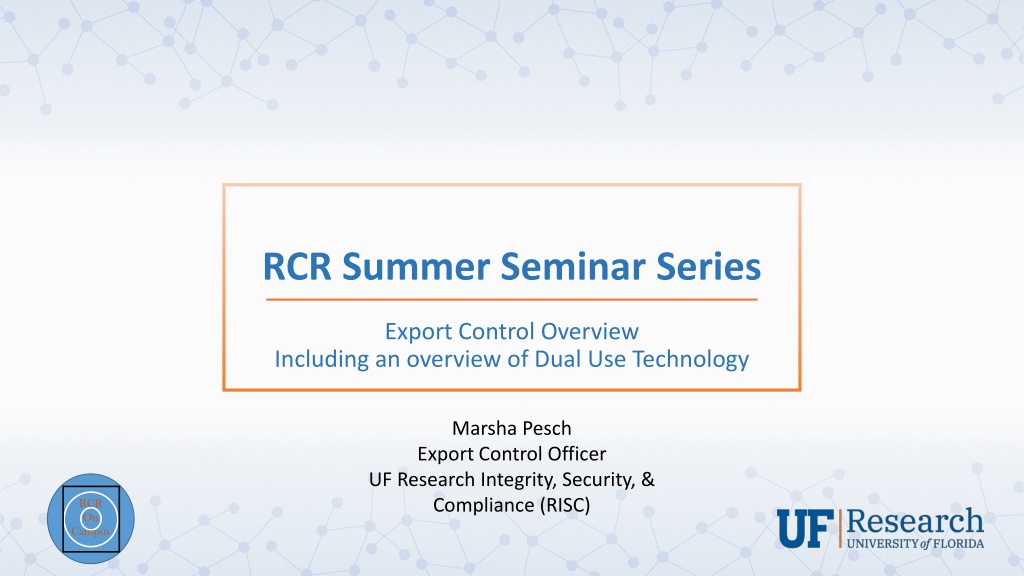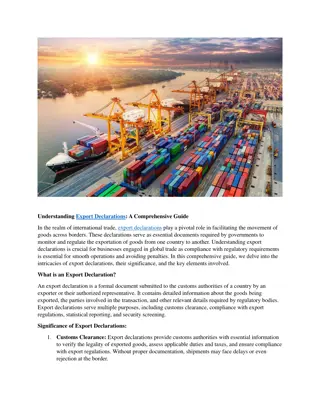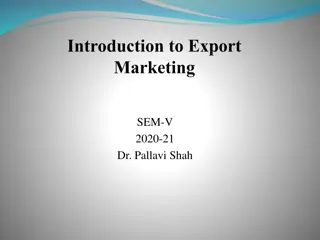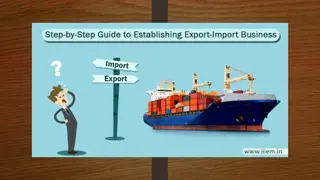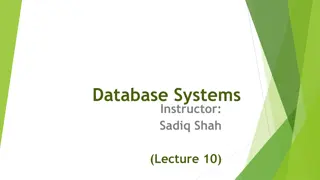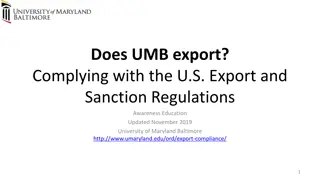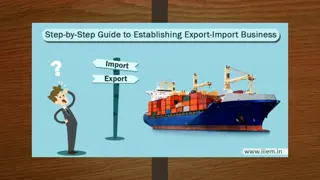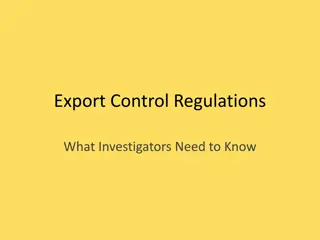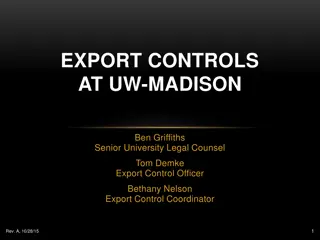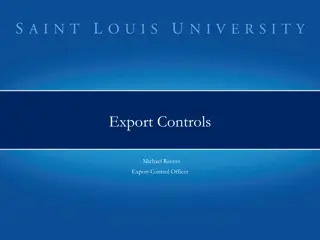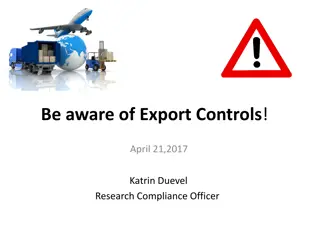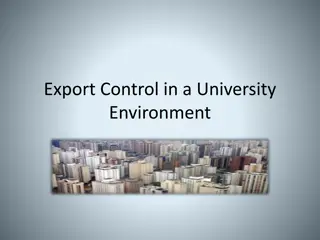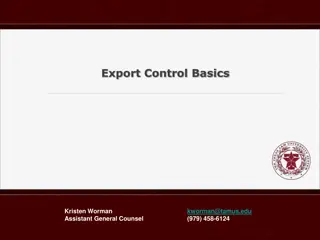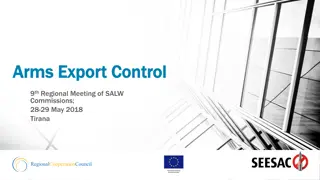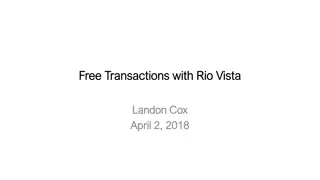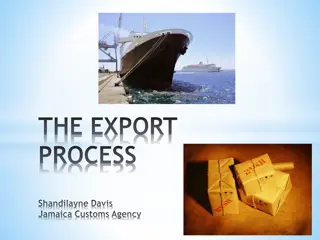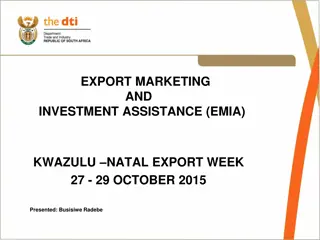Understanding Export Control Regulations for Research Integrity
Explore the intricacies of export control regulations, focusing on dual-use technology, with insights from Marsha Pesch, an Export Control Officer at UF. Gain knowledge on why export controls matter, how they apply to research, key definitions, and prohibited activities. Discover the impact on international collaborations, travel, and shipping in the context of research compliance. Uncover the basics of United States export control laws and their significance for national security and foreign policy.
Download Presentation

Please find below an Image/Link to download the presentation.
The content on the website is provided AS IS for your information and personal use only. It may not be sold, licensed, or shared on other websites without obtaining consent from the author. Download presentation by click this link. If you encounter any issues during the download, it is possible that the publisher has removed the file from their server.
E N D
Presentation Transcript
RCR Summer Seminar Series Export Control Overview Including an overview of Dual Use Technology Marsha Pesch Export Control Officer UF Research Integrity, Security, & Compliance (RISC) RCR On Campus
Reminders You must log in with UFL email in order to receive certificate credit Please take the survey after the class we value your feedback In order to allow for free flow of ideas and questions, we will not record the session Slides and other materials will be sent to attendees after the class RCR On Campus
RCR Certification Mentor/Mentee Relationships- Finding the Right Balance Collaborative Research Conflicts of Interest Data Management and Artificial Intelligence Compliance at UF & Research Misconduct Overview Research Misconduct: Plagiarism Research Misconduct: ORI: The Lab Ethics of Authorship Rigors of Peer Review Reproducibility & Replicability IRB & Informed Consent Export Control Overview Including an overview of Dual Use Technology Putting it All Together RCR On Campus
UF Research Enterprise RCR On Campus
Agenda Understand Export Control Basics Export Controls at UF Export Control Regulations Understand Key Definitions Dual-Use Important Exclusions Prohibited Activities Export Control Red Flags International Collaborations, Travel and Shipping How Export Controls Apply to RCR RCR On Campus
Export Controls At A Glance United States Export Controls are a complex set of regulations in place to ensure national security, economic stability, prevent the proliferation of weapons of mass destruction, and further U.S. foreign policy. U.S. Export Control laws govern the transfer of commodities, software, and technical data (information) overseas or to a foreign national within the United States. Export controls primarily include three sets of regulations: International Traffic in Arms Regulations (ITAR) Export Administration Regulations (EAR) Economic and Trade Sanctions governed by the Office of Foreign Assets Control (OFAC) RCR On Campus
Why Do I Need To Know About Export Controls? Conduct Research involving subjects or technologies listed on U.S. government controlled lists Research will involve exports outside of the U.S. Research sponsor indicates your project is controlled Collaborate with foreign researcher, student or entity, wherever located Research involves travel, imports, providing something of value, or financial transactions with sanctioned entities or countries RCR On Campus
POLL: Who Does Export Controls Apply to at UF? Every Faculty Member, Staff Member, and Student play an important roll in ensuring compliance with U.S. Export Controls at UF. RCR On Campus
Export Controls at the University of Florida It is the policy of the University of Florida to comply with all federal and state laws pertaining to exports. All UF projects and programs must adhere to the UF Export Control Policy and all applicable laws. The Export Control Officer within UF RISC serves as the institutional expert on export control laws and regulations. UF RISC is here to provide guidance to faculty, staff and students. Contact us anytime: 352-392-9174 exportcontrol@research.ufl.edu RCR On Campus
Who Regulates Export Controls? U.S. Department of Commerce, Bureau of Industry and Security Export Administration Regulations (EAR) Controls commercial, dual-use, and less sensitive military items Controlled items are either described on the Commerce Control List (CCL) or designated EAR99 U.S. Department of State, Directorate of Defense Trade Controls International Traffic in Arms Regulations (ITAR) Controls military items Controlled items are described on the U.S. Munitions List (USML) U.S. Department of the Treasury Office of Foreign Assets Control Administers and enforces economic and trade sanctions Comprehensively Sanctioned: Cuba, Iran, North Korea, Sudan, Syria, Crimea Region of the Ukraine Note: Other agencies also have a role in limited circumstances, e.g., NRC and DOE. RCR On Campus
Key Definitions Export Shipment or Transmission of controlled items, technology, software or assistance to a foreign person either outside or inside of the United States. Export Examples Shipping items to other countries Visual inspection of ITAR-controlled equipment or data Emails of technical data Visits Phone calls or in-person conversations Placing controlled information in public domain Presenting at conferences Hand-carrying controlled items during international travel Webinar/shared screen with technical data Deemed Export Release of technology or source code to a foreign person is a deemed export to the foreign person s country of citizenship or permanent residence. RCR On Campus
What Do Universities Export? Controlled technical data and information are the most common items university researchers export. Activities which may indicate additional controls are necessary: International travel to sensitive countries especially when bringing any UF- owned item or data. Transfer/disclosure of controlled items to a foreign national. International research collaborations. Participation by a foreign person on a controlled research project. International shipments or temporary export of equipment, items or software. RCR On Campus
Dual-Use Dual-Use BIS is responsible for regulating the export of most commercial items, often referred to as dual-use items, which are those having both commercial and military or proliferation applications. RCR On Campus
Dual-Use Electronics Computers Aeronautic Systems Energy Systems Software Optics Space Marine Materials Radar RCR On Campus
Dual-Use Dual-Use Items and Technology may require a license in certain situations: National security Foreign Policy Short Supply Nuclear Non-Proliferation Missile Technology Chemical and Biological Weapons Regional Stability Crime Control Terrorist Concerns RCR On Campus
Important Exclusions Fundamental Research Exclusion Basic and applied research, AND At an accredited institution of higher learning in the U.S., AND Research results are ordinarily published and shared broadly within the scientific community As long as these conditions are met, the results of the research are not subject to the ITAR or EAR Fundamental Research does not apply to agreements or awards containing publication, dissemination, or nationality restrictions. RCR On Campus
Important Exclusions Public Domain Exclusion Information which is published and generally accessible to the public Examples include: published papers Through unlimited distribution at a conference generally accessible to the public in the United States information found at libraries Educational Information Exclusion Educational information is defined as information released through catalog classes or labs at institutions of higher learning. Educational Information is not subject to the U.S. Export Regulations. RCR On Campus
Export Control Red Flags Associated Agreements Foreign Travel, Collaboration,or Sponsor Listed Technology USML or CCL NDA or MTA Military, Space- relatedsponsors Contractual Issues Contractual Issues Publication Restrictions FN/Citizenship Restrictions NASA, DoD, DoE Cuba, Iran, Syria, North Korea, Crimea Region, China, Russia, Venezuela Shipping or Physical Exports High-Risk Sponsors RCR On Campus
Why are Export Controls Important? Export control violations can result in penalties and fines which may apply to an individual, the institution or both. Loss of Export Privileges Suspension/Debarment from Government Contracting Monetary Fines in excess of $1 million per violation Jail time up to 20 years per violation RCR On Campus
Prohibited Activities Export of controlled goods, technology, or software/source code without a license or other authorization to prohibited destinations, end-users, or end-use Certain activities with, or some travel to, U.S. sanctioned countries (Balkans, Belarus, Burma, Burundi, Central African Republic, China, Cote d Ivoire, Cuba, Congo, Iran, Iraq, Lebanon, Liberia, Libya, North Korea, Russia, Somalia, Syria, Crimea Region of Ukraine, Venezuela, Yemen, Zimbabwe)** Import from, travel to and engagement with comprehensively sanctioned countries must be approved via either general or specific license. ** Sanctions regulations change frequently, call UF RISC for additional information. RCR On Campus
International Collaborations and Partners Two main concerns: (1) access to ITAR or EAR information and (2) working with denied parties or Military End- Users Valid Visa holders requiring access to controlled equipment and information must have a license or exemption Denied Party? Request restricted party screening from UF Research Integrity Physical shipments of commodities, research samples, or equipment RCR On Campus
Travel and Conferences Travel to most countries and bringing typical items with you will not require a license (e.g., standard laptop, cell phone, personal items) Caution: Comprehensively Embargoed Countries (Crimea Region of Ukraine, Cuba, Iran, North Korea, Syria) Caution: Countries of Concern (China, Russia, Venezuela) Caution: Hand-Carry or Shipping Special Equipment (e.g., valued >$2500, infrared camera) Caution: Do not present or discuss any controlled information, even at domestic conferences RCR On Campus
Travel Reminders Travel Authorizations myUFL UFIC Registration https://internationalcenter.ufl.edu/travel/online-travel- registration Asset Management Registration https://myassets.fa.ufl.edu RCR On Campus
International Shipping WHAT WHERE Where are you shipping to? Is the destination permissible for receipt of this item and its end use? Is a license required? Are there Import restrictions at the destination? WHO Who are you shipping to? Are they the ultimate end user? Have the individuals and their organization(s) been screened against lists for excluded parties? What is being shipped? What is its Export Control Classification Number? What is the value of the item(s)? WHY What is the end use of the item and is the end use permissible without a License? RCR On Campus
Export Control Scenarios to Consider Before collaboration begins, consider the following: Are my collaborators on the U.S. denied entity/persons lists? Contact UFRI for a restricted party screening (RPS). Will I travel to, import from or interact with a comprehensively sanctioned country or a country of concern? Severe restrictions will apply and a license may be required in advance. Will foreign persons come work with me at UF or in foreign countries? Contact UF RISC for a RPS and license, if needed. Will I present my research results at domestic or international conferences? Ok as long as controlled information is not presented and not in a comprehensively embargoed country. Does my funding contract or grant place restrictions on publications or participation by foreign persons? If yes, will nullify certain exemptions to export control laws. Will I ship or hand-carry anything, including data or software? If controlled or $2500 or more, may require license and Customs filing. RCR On Campus
What if My Project Is Export Controlled? Technology Control Plan (TCP) An internal UF plan ensuring protection of export controlled articles, software, and technical data. Commitment to Compliance Identifies Controlled Articles and Technical Data (CATD) Categorizes CATD on the USML or CCL Contractual Terms Defines Physical Security Requirements Defines Information Technology Requirements Certifications RCR On Campus
How Does Export Control Apply to RCR Export Control regulations are an important to all aspects of research. Shipping internationally may have requirements, no matter what your field of expertise. Sanctions apply to all individuals on campus who may engage with or travel to countries of concern. Export Controls does not only affect military research. While UF RISC manages the export control program, it may have implications to many aspects of UF business. RCR On Campus
Need Help? We Are Here! UF RISC Carter Post ComplianceSpecialist cpost@ufl.edu exportcontrol@research.ufl.edu 352-392-9174 Marsha Pesch Associate Director Export Control Officer mpesch@ufl.edu William Bucha Compliance Specialist wbucha@ufl.edu RCR On Campus
Thank you! Please take the survey at: https://ufl.qualtrics.com/jfe/form/SV_1WVLQUcrykr7YFM RCR On Campus
If You Suspect Research Misconduct Research Misconduct means fabrication, falsification, or plagiarism in proposing, performing, or reviewing research, or in reporting research results. Make a confidential report to the UF Research Integrity Officer (RIO) Cassandra C. Farley (352) 273-3052 | cfarley@ufl.edu Questionable Research Practices are reports of careless, irregular, or contentiousresearch practices, as well as authorship disputes, may not meet the standard for research misconduct but may be a research integrity violation. You may also report anonymously UF Compliance Hotline: 877-556-5356 Still not sure if it is Misconduct or a QRP? The RIO can help you better understand the situation. You can speak in hypotheticals as you consider making an official allegation. RCR On Campus
